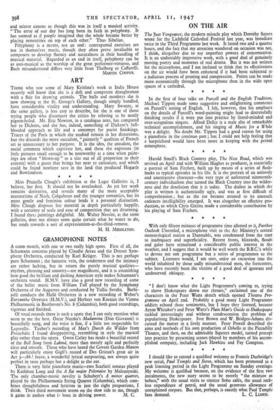The 7ust Vengeance, the modern miracle play which Dorothy Sayers
wrote for the Lichfield Cathedral Festival last year, was broadcast twice in the Third Programme last week. It lasted two and a quarter hours and the fact that my attention wandered on occasion was not, I think, altogether due to my imperfect powers of concentration. It is an undeniably impressive work, with a good deal of genuinely moving poetry and moments of real drama. But it was not written for the microphone, and I am inclined to think that its effectiveness on the air would have been enhanced if it had been subjected to a judicious process of pruning and compression. Points can be made more. economically through the microphone than in the wide open spaces of a cathedral.
* * * * In the first of four talks on Purcell and the English Tradition, Michael Tippett made some suggestive and enlightening comments on Purcell's setting of English. I felt, however, that his emphasis on the details of Purcell's word-painting might lead to distressfully finicking results if it were put into practice by literal-minded and over-scrupulous singers. Alfred Deller is a male alto of remarkable technical accomplishment, and his singing of Music for a While was a delight. No doubt Mr. Tippett had a good reason for using a pianoforte in the continuo part ; but I could not help feeling that a harpsichord would have been more in keeping with the period atmosphere, Harold Small's Black Country play, The New Road, which was revived on April znd with William Hughes as producer, is essentially a portrait of Sam Fitchett, built up by means of a series of flash- backs to typical episodes in his life. It is the portrait of an unlovely and unattractive character—the very type of unfettered nineteenth- century individualism that turned the Black Country into the wilder- ness and the desolation that it is today. The dialect in which the play is written is authentically ugly, and was at first difficult of comprehension ; but as the ear became attuned to its uncouth cadences intelligibility emerged. It was altogether an effective pro- duction, to which Chris Gittins made a considerable contribution by his playing of Sam Fitchett.
With only fifteen minutes of programme time allotted to it, Further Outlook Unsettled, a microphone visit to the Air Ministry's central meteorological station at Dunstable, was condemned from the start to inadequacy and superficiality. Recent frosts, blizzards, floods and gales have stimulated a considerable public interest in the weather, and I suggest that it would be well worth the B.B.C.'s while to devote not one programme but a series of programmes to the subject. Listeners would, I am sure, enjoy an excursion into the world inhabited by those sadly misunderstood men, the forecasters, who have recently been the victims of a good deal of ignorant and undeserved obloquy.
* * "I don't know what the Light Programme's coming to, trying to shove Shakespeare down our throats," exclaimed one of the characters in the Peter Watts sketch which opened Theatre Pro- gramme on April znd. Probably a good many Light Programme addicts echoed these sentiments, but I hope they listened, because Ayton Whitaker's and Peter Watts's Plain Man's Guide to Shakespeare tackled interestingly and without condescension the problem of popularising Shakespeare. Ivor Brown and W. Bridges-Adams dis- cussed the matter in a lively manner. Peter Powell described the aims and methods of his own production of Othello at the Piccadilly Theatre, and then, on the admirable Squeers model, turned precept into practice by presenting scenes tlayed by members of his accom- plished company, including Jack Hawkins and ay Compton.
I should like to extend a qualified welcome to Francis Durbridge's new serial, Paul Temple and Steve, which has been promoted to a peak listening period in the Light Programme on Sunday evenings. My welcome is qualified because, on the evidence of the first two instalments, the new story seems to be merely "the mixture as before," with the usual visits to sinister Soho cafés, the usual reck- less expenditure of petrol, and the usual generous allowance of unexplained corpses. But that, perhaps, is exactly what Paul Temple


































 Previous page
Previous page